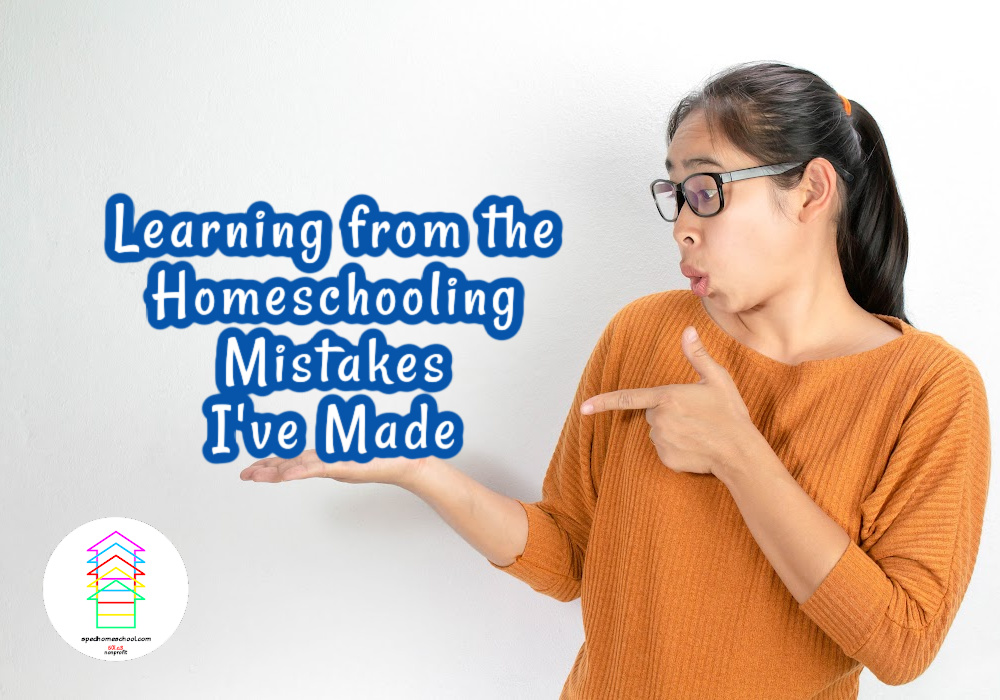
By Ali Sanders, SPED Homeschool Community Member
Mistake #1 – Compared myself to other homeschoolers
This never ends well. Sure, there might be the rare occasion that you find out your child is further ahead in math, but more likely, you will think about all the things your family isn’t doing that others are doing. The problem is there are ample opportunities for comparison, especially if you are on social media. This becomes even more problematic when you have teenagers and the stakes are higher – who got into what college or who had 60 hours of dual credit and a 4.0 when they graduated. For parents of special needs kids, this is even more insidious. The jealousy that creeps in from comparison can steal the joy of your child finally being about to button their clothes themselves or tie their shoes. Their big accomplishment might be getting a part-time job, but we should celebrate it just as much as another child’s volleyball scholarship. It is impossible to do all the things: karate, violin, soccer, track, theater, volunteering, etc, let alone do them well. In fact, some children may not be able to handle much beyond one extra activity and the part-time job may count as that. Which brings me to number two.
Mistake #2 – Over-scheduled our time
Do you know what happens when you over-schedule one of my sons? Complete and utter meltdown. I didn’t do well with it either. He was already worrying about the afternoon soon after he woke up in the morning, and it affected our school days at home. Some kids thrive on being out of the house every day of the week, but in my experience, my special kids thrive when they have one specific activity they love. It might be more than one day a week, but it must be regular and predictable. They love regular and predictable. Often they would be happy to just stay in their rooms for hours on end. There, they can focus easier, or their anxiety is quieted. However, too much of that can lead to the next problem.
Mistake #3 – Let things become too stagnant
It is lovely when things feel “comfortable”, but it is dangerous too. Sometimes that turns into laziness, and we might not be challenging ourselves or our kids anymore. As much as they need routine and predictability, they also need challenges and flexibility. That may be with academics that we are being too easy with or it may be with not pushing them out of their comfort zones. One of my kids loves theater and loves being the center of attention. She wanted to do a drama class once a week. It was an easygoing drama group, so I pushed my son to go with her. He complained often, but it turned out to be one of the best things for him. I watched a few times and got nervous every time they did improv exercises or warm-ups, but he got comfortable with it and actually enjoyed it. They ended up doing it for two years and he performed on the stage twice with lines and songs and everything! I never would have imagined that happening before. This goes along with number four.
Mistake #4 – Stick with something for too long
Everybody will do this at some point. Years later, they will still mentally hit themselves for not quitting that sport or co-op sooner, for not noticing the emotional toll it had on their kids. It took me years, too many years, to learn how to be okay with ripping pages out of the curriculum and NOT checking every box. I had to learn that I was not a failure because we quit a very rigorous classical co-op that was not a good fit for some of my kids. Nothing is one size fits all. With kids on every end of the spectrum, it makes it particularly tricky finding things we can do together, but not impossible. We have been at our current co-op for the last four years, and it has a pleasant mix of eclectic and academic. We also do cross-country together. The season is short. We can run together. It is not a hyper competitive team sport or an activity with judging, so it feels easy going. Most of all, it teaches them perseverance.
Mistake #5 – Had a panic attack about homeschooling
Sometimes the responsibility of being the teacher, principal, guidance counselor and parent bears down on us with the weight of a thousand suns. For me, that day came when my oldest at 16 decided ongoing to a very competitive college. I am a lifelong homeschooler, but suddenly, I realized it would be all my fault if he couldn’t get into college. Suddenly, I couldn’t breathe. Of course, that wasn’t totally true, but it was all I could feel in that moment. The good news is that after many weeks of prayer and heavy research on “how to get your homeschooler into college”, we figured out how to pick the right courses and path to get him what he needed on a transcript. And thankfully, he is now in college (though I think he should get all the credit for that). The thing to remember is that it is impossible to teach your kids everything. There will be gaps. There may be things they know other kids don’t and vice versa. Work on their weaknesses, but remember what the big picture is. What are your primary goals with homeschooling? What is your focus as they grow into adults? I would guess it’s not just academics. Maybe it is character, relationships, building confidence, etc. Make a list and keep it nearby. When things get too heavy, look at your list of reasons, and take a deep breath.
About Ali:
We have five kids age 10 to 20 years old, two of which joined our family through adoption. Some of the differences in our kids include autism, ADHD, dyspraxia, and vision impairment. I am so grateful to live in Texas and get to home school my kids, and some of my favorite things are books, animals, dark chocolate, and the color green.

